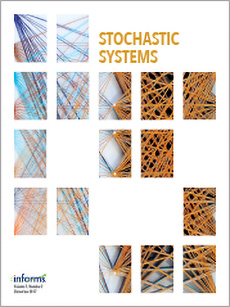Abstract
We consider the optimal control of matching queues with random arrivals. In this model, items arrive to dedicated queues, and wait to be matched with items from other (possibly multiple) queues. A match type corresponds to the set of item classes required for a match. Once a decision has been made to perform a match, the matching itself is instantaneous and the matched items depart from the system. We consider the problem of minimizing finite-horizon cumulative holding costs. The controller must decide which matchings to execute given multiple options. In principle, the controller may choose to wait until some “inventory” of items builds up to facilitate more profitable matches in the future.
We introduce a multi-dimensional imbalance process, that at each time $t$, is given by a linear function of the cumulative arrivals to each of the item classes. A non-zero value of the imbalance at time $t$ means that no control could have matched all the items that arrived by time $t$. A lower bound based on the imbalance process can be specified, at each time point, by a solution to an optimization problem with linear constraints. While not achievable in general, this lower bound can be asymptotically approached under a dedicated item condition (an analogue of the local traffic condition in bandwidth sharing networks). We devise a myopic discrete-review matching control that asymptotically–as the arrival rates become large–achieves the imbalance-based lower bound.
Citation
Itai Gurvich. Amy Ward. "On the dynamic control of matching queues." Stoch. Syst. 4 (2) 479 - 523, 2014. https://doi.org/10.1214/13-SSY097
Information





